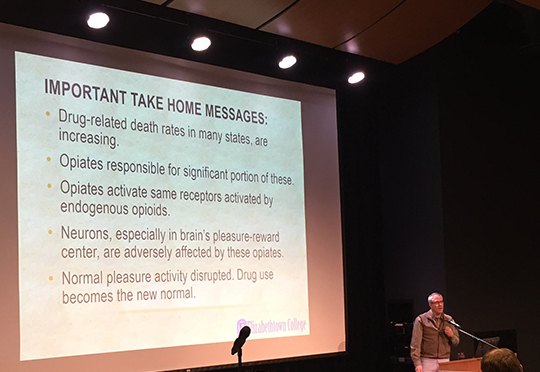With TV news cameras rolling and community members taking notes, an on-campus event offered potential for far-reaching impact on south-central Pennsylvania.
Elizabethtown College hosted an Opioid Epidemic Symposium at 7 p.m. Monday, Feb. 19, in the College’s Gibble Auditorium. Community members, students and faculty and staff members packed the auditorium, listening to presentations by experts and posing questions about the future of the opioid epidemic.
Elizabethtown College Professor of Social Work and Department Chair Susan Mapp spearheaded the development of the symposium with support from Jean Pretz of the Psychology Department, which co-sponsored the event. Mapp invited five presenters—Mary Dolheimer, board member of Not One More York; Associate Professor of Biochemistry Thomas Hagan; social work alum and Naaman Center employee Kate Eberz; Professor of Political Science Fletcher McClellan, and Gail Viscome, executive director of Elizabethtown Area Communities That Care.
I see that there is so much hope.”
Though the panelists spoke from different areas of expertise, all emphasized opium’s impact on Pennsylvania. Dolheimer opened with a chronology of her son’s struggle with addiction, and she, Ebbers and Viscome described the individual efforts of their organizations. McClellan and Hagan respectively offered political and scientific background on the rise of America’s drug crisis. Hagan’s presentation featured a map of states with great increases in drug-related deaths over the past four years. The audience audibly gasped at the sight of the northeast covered in red—with a crimson Pennsylvania smack-dab in the middle.
Although the opioid epidemic has been declared a public health crisis by the administration of U.S. President Donald Trump, the presentations promoted health, help and hope. Junior psychology major Alicia Bohn attended the symposium due to her interest in pursuing a career in clinical psychology and counseling. She said the story of Dolheimer and Not One More, a non-profit that offers support and resources for individuals and families affected by drug addiction, stuck with her.
“Seeing how organizations like Not One More in the community are bringing more awareness to this problem makes me realize how many people care and are willing to learn about this and help,” Bohn said.
Mapp correctly predicted the event would be well-attended by social work and psychology majors. “Many students are here because they care about society,” Mapp said. “They want to make the world a better place, and this is something that is personally touching more and more people.”
Dolheimer and Viscome, who have seen the impact of addiction first-hand, emphasized the potential of a drug-free future.
Viscome put it best in her presentation, fittingly the final one of the night—“I see that there is so much hope.”


